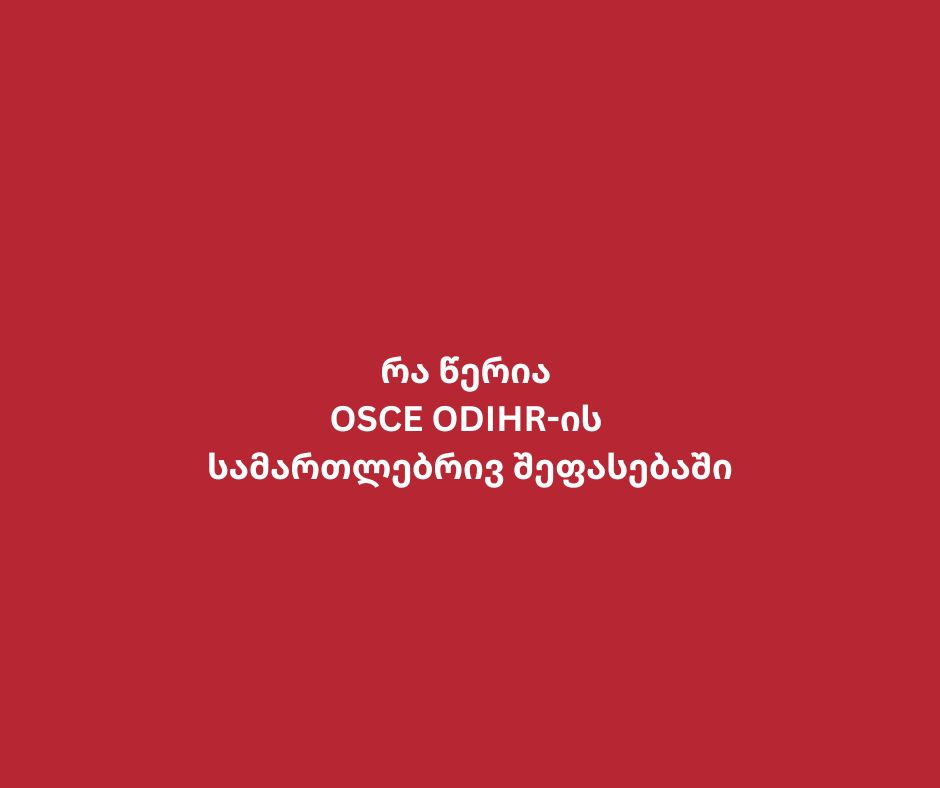What the OSCE ODIHR legal assessment says about the ‘Russian law’
Popular





Following the Venice Commission's conclusion urging the Georgian government to repeal the current form of the Russian law on the transparency of foreign influence, the OSCE Office for Democratic Institutions and Human Rights (ODIHR) has issued an urgent legal assessment. According to this assessment, the law "contains serious flaws that make it incompatible with international human rights standards." The evaluation calls on the Georgian authorities to revoke the law.
According to the assessment, the primary justification for the law focuses on "foreign influence" and "transparency." The document suggests that, in response to "foreign influence," it would have been possible to use less intrusive measures, such as professional lobbying or clearly defined regulations on expressing foreign interests that impact the public decision-making process. These measures would be distinctly different from the daily activities of civil society organizations. The document also notes that "transparency" is and has been the main justification for the adoption or initiation of similar laws in countries such as the Russian Federation, Hungary and Kyrgyzstan, as well as the Republika Srpska within Bosnia and Herzegovina.
According to the assessment, general guidelines on the public interest regarding the legality of civil sector financing, without an analysis of the risks of the non-governmental sector's involvement in crimes such as corruption and money laundering, as well as specific, well-founded threats to national security, cannot serve as a legitimate basis for limiting the right to association.
The assessment highlights that the explanatory note of the law does not clarify whether the authors conducted a thorough review of existing legislation to determine if their objectives could be met through current laws or by enhancing them, including financial or tax regulations. Additionally, ODIHR's evaluation points out that the explanatory note lacks an impact assessment, particularly failing to analyze the potential effects on the rights of association, press, and expression.
The assessment emphasizes that the examples cited in the explanatory note such as the US Foreign Agents Registration Act (FARA) and Australia's Foreign Influence Transparency Scheme Act, differ fundamentally from the objectives and scope of the Georgian law. According to the analysis, while these laws mandate public registration for organizations directly involved in advocacy and lobbying on behalf of foreign governments, they do not categorize civil society or media organizations as foreign representatives merely because they receive funding from abroad.
The analysis focuses on the existence of a discriminatory approach to organizations based on the origin of their funding. According to the document, discriminatory treatment against specific categories of organizations or associations based on their funding sources should be considered from the perspective of sectoral equity. This means that the regulations applied to these associations should not be more stringent than those applied to commercial establishments or businesses in general. ODIHR suggests that because the law fails to adequately justify differing treatment based on funding sources, it may be considered discriminatory.
The assessment also asserts that imposing new obligations on organizations receiving funding from foreign sources imposes certain restrictions on the exercise of the right to association. Moreover, disclosing foreign funding poses the risk of stigmatization for these organizations.
Furthermore, the analysis highlights that the term "foreign power," given its broad definition, encompasses international and intergovernmental organizations, including those of which Georgia is a member and contributor. Hence, under the mentioned law, these organizations may also be classified as foreign powers. As a result, organizations receiving funding from them, such as the United Nations, would be regarded as representatives of foreign interests.
According to the document, the state's authority to request any personal or confidential information from any private or legal entity within the monitoring framework, including details about ethnic origin, political, religious, or other beliefs, is deemed excessive and violates the right to privacy.
Considering all aspects discussed, the OSCE's Office for Democratic Institutions and Human Rights calls upon Georgia to repeal the law.
The release of the assessment by the OSCE Office for Democratic Institutions and Human Rights (ODIHR) sparked mixed reactions within the country. Chairman of the Parliament, Shalva Papuashvili, alleged that the report was authored by Mikheil Saakashvili's lawyer, Jeremy McBride. However, ODIHR stated that the assessment was prepared by the organization's internal experts, and McBride was not involved in its creation.









